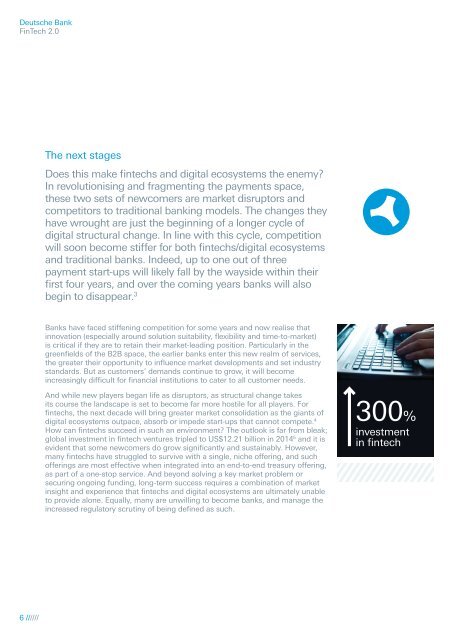FinTech 2.0
YKHHI
YKHHI
Create successful ePaper yourself
Turn your PDF publications into a flip-book with our unique Google optimized e-Paper software.
Deutsche Bank<br />
<strong>FinTech</strong> <strong>2.0</strong><br />
The next stages<br />
Does this make fintechs and digital ecosystems the enemy?<br />
In revolutionising and fragmenting the payments space,<br />
these two sets of newcomers are market disruptors and<br />
competitors to traditional banking models. The changes they<br />
have wrought are just the beginning of a longer cycle of<br />
digital structural change. In line with this cycle, competition<br />
will soon become stiffer for both fintechs/digital ecosystems<br />
and traditional banks. Indeed, up to one out of three<br />
payment start-ups will likely fall by the wayside within their<br />
first four years, and over the coming years banks will also<br />
begin to disappear. 3<br />
Banks have faced stiffening competition for some years and now realise that<br />
innovation (especially around solution suitability, flexibility and time-to-market)<br />
is critical if they are to retain their market-leading position. Particularly in the<br />
greenfields of the B2B space, the earlier banks enter this new realm of services,<br />
the greater their opportunity to influence market developments and set industry<br />
standards. But as customers’ demands continue to grow, it will become<br />
increasingly difficult for financial institutions to cater to all customer needs.<br />
And while new players began life as disruptors, as structural change takes<br />
its course the landscape is set to become far more hostile for all players. For<br />
fintechs, the next decade will bring greater market consolidation as the giants of<br />
digital ecosystems outpace, absorb or impede start-ups that cannot compete. 4<br />
How can fintechs succeed in such an environment? The outlook is far from bleak;<br />
global investment in fintech ventures tripled to US$12.21 billion in 2014 5 and it is<br />
evident that some newcomers do grow significantly and sustainably. However,<br />
many fintechs have struggled to survive with a single, niche offering, and such<br />
offerings are most effective when integrated into an end-to-end treasury offering,<br />
as part of a one-stop service. And beyond solving a key market problem or<br />
securing ongoing funding, long-term success requires a combination of market<br />
insight and experience that fintechs and digital ecosystems are ultimately unable<br />
to provide alone. Equally, many are unwilling to become banks, and manage the<br />
increased regulatory scrutiny of being defined as such.<br />
300%<br />
investment<br />
in fintech<br />
6 //////


